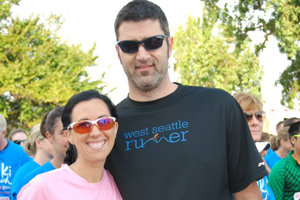Chasing a Diagnosis: Marathoner finally resolves hypoglycemia struggles

By Ellee Prince
Photo at right: Lori McConnell and her husband, Tim McConnell, show their West Seattle running pride at the Alki Beach 5K. Photo courtesy of Lori McConnell and West Seattle Blog
Lori McConnell stepped onto a treadmill. With an IV taped to the inside of her arm, she felt the machine start to move under her feet. Across the country, the 2012 Boston Marathon had already started. And, her friends were running without her: Instead of racing a PR and instead of pushing through Heartbreak Hill, this seasoned marathoner was chasing a diagnosis.
On that particular April morning, Lori was running inside the Seattle Performance Medicine exercise lab. Under the supervision of Dr. Emily Cooper, her insulin and blood glucose levels were tested. Both women were seeking answers to Lori’s heart arrhythmia, dizziness, extreme fatigue and crushing migraines, among other debilitating symptoms. The diagnosis would change the way she viewed everything—food, her body, running and life.
The diagnosis came back: Lori had postprandial hypoglycemia, commonly called low blood sugar.
Everything Changes
“It needs to be reversed,” Cooper says. “Not just from the athletic side. It’s about your quality of life. Your mood, your energy, your brain function, your potential, what you accomplish in life—all of that is affected.”
Blood sugar fuels exercise. When someone with hypoglycemia runs, the blood sugar can drop below normal. The body tries to counterbalance, deploying chemical responses in an attempt to rescue the body from a low blood sugar state.
Common symptoms range from irritability, anxiety, fatigue and headaches to memory and concentration issues. More severe symptoms can include sleep disruptions, sweating, dizziness, nausea and even passing out. Very rarely severely low blood sugar can pull someone into seizures.
The Alarming Signs
For many years Lori ran symptom-free. Her first marathon, in Portland, Oregon, inspired her. She was officially “a runner.” It wasn’t until eight years later, in the summer of 2005, that Lori realized something was seriously wrong.
Only five miles short of the San Diego Marathon finish line, Lori stumbled, weak and disoriented, into a medical tent with an alarming heart rate. She knew her race was over, but she didn’t understand that these symptoms would stay with her through the next nine years.
New symptoms would emerge—including mysterious weight gain—collectively baffling doctors and forcing her to take breaks from the road. Despite this, Lori desperately tried to continue with the sport that had become a way of life.
Still without a diagnosis, Lori, a mental-health counselor, and her husband Tim opened West Seattle Runner—a running store close to their home—in 2010. Over the years, she continued to race. At home, she ran along Alki Beach and the trails of Lincoln Park. She began to coach teams, running 30 or more miles alongside them during race days.
“Every loss in my life, every conflict, every conundrum, I always had the roads,” she says. “Running is my meditation. I understand some have yoga and other calmer ways, but my meditation is the moving sort.”
Still, she would often succumb to the symptoms, which sometimes emerged long after a daily run or race. Finally, after the 2012 diagnosis and another break from running, she slowly returned to the road. But this time, she had a plan.
One Step at a Time
That chilly November, Lori paced her breathing and her significantly slower steps. Before her run, she had eaten enough at just the right time and hadn’t missed any of her medications. As she ran, she timed her fueling—paying close attention to the signals her body might offer. She was overwhelmed, but running again—with dreams to return to coaching and even daring a future ultra-marathon. She was back in rhythm and continued to run for months. Unfortunately, it didn’t last.
“I rarely felt right,” Lori remembers. “I was sluggish, slow and I was steadily gaining weight. I guess I knew it wasn’t working.”
Hitting a Wall
In September, 2013, sitting across from Dr. Cooper, Lori was told she had to stop running. Again. A new medication was effective, but not quite enough.
In Cooper’s latest research she discovered an imbalance in suspected hormones and brain chemicals, which she believes causes a metabolic syndrome and contributes to hypoglycemic episodes.
The added stress of cardiovascular exercise can sometimes affect this imbalance even more, contributing to a domino effect of too-lows and too-highs—something Lori’s new medication was meant to prevent, but couldn’t completely. She had to stop running until her system could stabilize.
“I would rather not mess anything up,” Lori resolved, considering the medication’s expense. “It’s not worth it. I want to spend the time I need to, to get better.”
Cooper was adamant: “You don’t want to manage a chronic condition. You want to cure it. You want to resolve it. You want to make it go away.”
Finding a Solution
To resolve the hypoglycemia, Cooper treats the underlying metabolic condition, or “The Metabolic Storm,” as she has titled her recently released book. The body’s hormonal balance includes much more than the well-known estrogen and testosterone.
Hormones like ghrelin from the stomach, leptin from the fat-cells, and beta-endorphin (a naturally occurring opioid) all work in harmony. They are part of a critical “feedback loop” with melanocyte-stimulating hormone (MSH)—an important hormone in the brain that determines, among other things, whether the body is in the midst of a dire famine.
Stopping the cycle depends on severity, underlying genetics and exactly how the body needs intervention. Resetting this feedback loop allows the body to get back to the automatic process of living.
“Once you’re in this hole, coming out of it is not easy,” Cooper says, adding that it is still possible. “For the most part, most people do very well. Many people can turn this around by tightening up their nutrition, taking a short break from exercise and getting more sleep. For those who do need medication to break the cycle, it’s not usually a long-term necessity.”
Still Very Much a Runner
For Lori McConnell, that’s welcome encouragement. She still has plans for her running future. This means no more ultra-marathons or demanding race days, but she will still get her coaching certificate. She’ll continue to facilitate running and track groups through West Seattle Runner. She’ll keep her shoes close by—laced and ready. She will still live the runner’s life.
“It has been so long since I have laced up my shoes that I sometimes question if I am a runner still,” Lori says. “But, because I miss it so much—with every cell and all my heart—I guess it proves I am still very much a runner.”
Ellee Prince is a writer currently living in Southeast Ohio, focusing on magazine features and profiles, cultural criticism and reviews, creative nonfiction and fiction. Find more information at www.elleeprince.com, or check out her blog of personal essays at www.iammrsprince.wordpress.com



